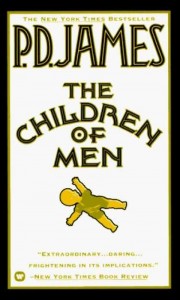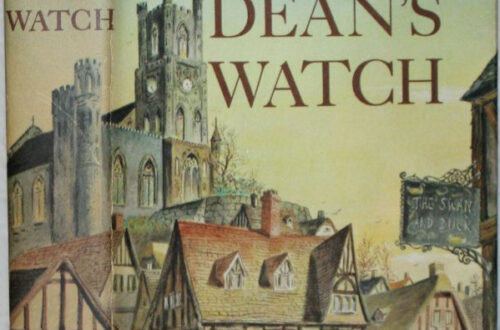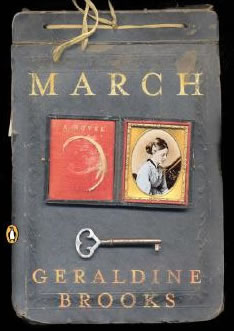The Children of Men
 The Children Of Men is my first P.D. James novel. I saw this movie last spring, and though I usually read the book first and see the movie afterward, in this case I didn’t know the book existed when I saw the movie. I was curious: how would the two compare?
The Children Of Men is my first P.D. James novel. I saw this movie last spring, and though I usually read the book first and see the movie afterward, in this case I didn’t know the book existed when I saw the movie. I was curious: how would the two compare?
There were enough contrasts that I found myself regarding the two versions as different stories. They share the same basic situation, though: a futuristic world in which the human race has utterly lost the ability to reproduce. There are no children. Then something verging on the miraculous happens: a child is conceived, and the story’s protagonist Theo Faron is drawn into a tiny group of revolutionaries bent on protecting the pregnant woman. The ensuing adventure inspires plenty of reflection about what the world might be like without children.
As one character puts it, “Whatever man has done for good or ill has been done in the knowledge that he has been formed by history, that his life-span is brief, uncertain, insubstantial, but that there will be a future… That hope is finally gone except in the mind of fools and fanatics.” Both movie and book probe such questions as what becomes of government, human nature, religion, class, and general psychological health when the end seems near. It’s been almost a year since I saw the movie, but as I recall it approaches these questions very differently from the book, altering the plot and characters significantly in the process.
In the book, I found the main character, Professor Theo Faron, more like the butler Mr. Stevens in Kazuo Ishiguro’s Remains of the Day. He’s eminently proper, an unreliable narrator trapped inside the brittle walls of his selfishness whose moments of insight fail to yield any growth or change in his character. But unlike Stevens, he finds himself thrust into bizarre circumstances that shatter his rigid control and challenge him to love. I found myself liking him more in the book, despite the fact that in the movie he’s played by Clive Owen (a.k.a. King Arthur).
One of the odd effects of childlessness in the England depicted in the book is the purchasing of dolls or pets to dote on as an outlet for thwarted parental instinct. British society here resembles Orwell’s in some respects: it’s extremely regulated, with marked social classes, and a government that creates a sense of security through increasingly problematic means.
More central to the book than to the movie is the question of what happens to Christianity in such a world. Some branches liberalize and drift away from tradition, christening animals and dolls. Others see the plight as God’s judgment and become self-flagellators. Some few remain faithful to “the old books” (which in the world of the book is pre-1995). One of Theo’s dilemmas is to figure out whether he has any vestige of his childhood faith left, and whether he dares to take a leap of faith — an unattractive proposition to this play-it-safe man who remembers the martyrdom of five missionaries in South America in the 1950’s as the natural result of any attempt to bring positive change.
But his main challenge is whether or not he can love, and get involved with others in a worthy enterprise. “I am fifty years old and have never known what it is to love,” he writes in his treasured diary. “I can write those words, know them to be true, but feel only the regret that a tone-deaf man must feel because he can’t appreciate music.” But Julian, the potential mother, puts the crux of the matter most succinctly: “The world is not changed by the self-regarding, but by men and women prepared to make fools of themselves.”
With apologies for such a long post, I’ll wrap it up by saying that I enjoyed my first encounter with P.D. James, and on the whole I found this book richer, less assaultive, and more thought-provoking than its movie counterpart. But I’m not sorry I saw the movie. The two works struck me as so different, I left the movie behind and experienced the book as a new thing altogether.


